View in other NatureServe Network Field Guides
NatureServe
Montana
Utah
Wyoming
Idaho
Wisconsin
British Columbia
South Carolina
Yukon
California
New York
Long-leaf Evening-primrose - Camissonia subacaulis
Other Names:
Oenothera subacaulis, Taraxia subacaulis
Native Species
Global Rank:
G5
State Rank:
S3S4
(see State Rank Reason below)
C-value:
5
Agency Status
USFWS:
USFS:
BLM:
External Links
State Rank Reason (see State Rank above)
Camissonia subacaulis is found in several counties and the most recent of observations indicate that where the plant is found it can be common.
- Details on Status Ranking and Review
Range Extent
ScoreF - 20,000-200,000 sq km (~8,000-80,000 sq mi)
Area of Occupancy
ScoreE - 26-125 4-km2 grid cells
Number of Populations
ScoreC - 21 - 80
Number of Occurrences or Percent Area with Good Viability / Ecological Integrity
ScoreC - Few (4-12) occurrences with excellent or good viability or ecological integrity
Environmental Specificity
ScoreC - Moderate. Generalist or community with some key requirements scarce
Long-term Trend
ScoreU - Unknown
Trends
ScoreU - Unknown
Threats
ScoreU - Unknown
CommentThreats: Unknown/undetermined.
General Description
Plants: Taprooted, short-lived, acaulescent perennial. Herbage glabrous (Lesica 2012), seldom with a few straight, stiff hairs (Hickman 1993).
Leaves: Petiolate, all basal; the blade lanceolate to oblanceolate, sometimes pinnately lobed below, 4–15 cm long (Lesica 2012).
Inflorescence: Flowers sessile in leaf axils (Lesica 2012).
(Lesica's contribution adapted from
Lesica et al. 2012. Manual of Montana Vascular Plants. BRIT Press. Fort Worth, TX)
Phenology
Flowers May-August (Niehaus & Ripper, 1976).
Diagnostic Characteristics
Similar to Oenothera flava, which has long stigma lobes, and to Camissonia breviflora, which has deeply incised leaves.
Species Range
Montana Range
Range Descriptions
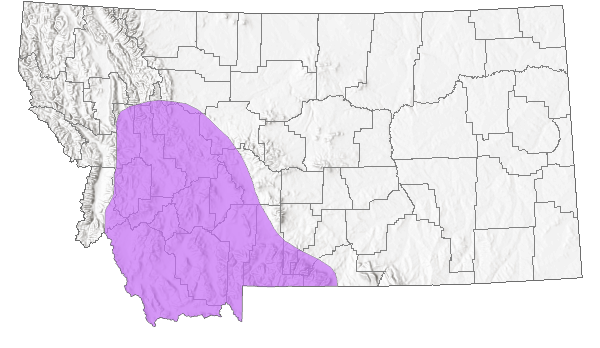
 Native
Native
Range Comments
WA to MT south to CA, NV, UT and CO (Lesica et al. 2012. Manual of Montana Vascular Plants. BRIT Press. Fort Worth, TX).
Observations in Montana Natural Heritage Program Database
Number of Observations: 31
(Click on the following maps and charts to see full sized version)
Map Help and Descriptions
Relative Density
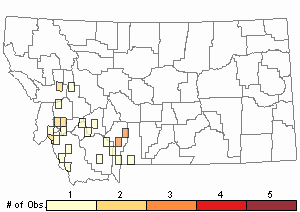
Recency
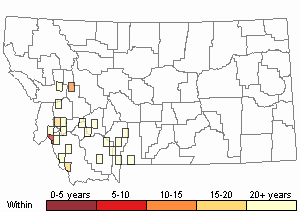
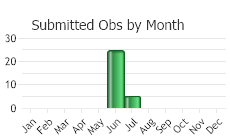
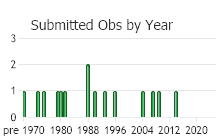
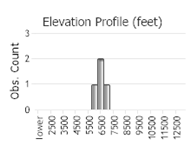 (Observations spanning multiple months or years are excluded from time charts)
(Observations spanning multiple months or years are excluded from time charts)
Habitat
Substrate: Generally in clay soils (Hickman 1993).
Habitat: Grows in meadows that are moist in spring. In Montana, these meadows are found around persistent snow at moderate elevations.
Reproductive Characteristics
Flowers: 4-merous; hypanthium 2–5 cm long, the upper expanded portion 1–3 mm long; sepals 6–15 mm long, reflexed; petals 7–15 mm long, yellow (Lesica 2012); anthers joined at the base to the filament (Hickman 1993); stigma globose, slightly lobed (Lesica 2012).
Fruit: Capsule sessile, ovoid, 13–25 mm long, 4-sided (Lesica 2012); seeds in 2 lines per locule, light brown, 1.3-1.9 mm (Hickman 1993).
Usually cross-pollinated (Hickman 1993).
(Lesica's contribution adapted from
Lesica et al. 2012. Manual of Montana Vascular Plants. BRIT Press. Fort Worth, TX)
Stewardship Responsibility
References
- Literature Cited AboveLegend:
 View Online Publication
View Online Publication J.C. Hickman, J.C. (editor). 1993. The Jepson Manual: Higher Plants of California. Berkeley: University of California Press. 1400 pp.
J.C. Hickman, J.C. (editor). 1993. The Jepson Manual: Higher Plants of California. Berkeley: University of California Press. 1400 pp. Lesica, P., M.T. Lavin, and P.F. Stickney. 2012. Manual of Montana Vascular Plants. Fort Worth, TX: BRIT Press. viii + 771 p.
Lesica, P., M.T. Lavin, and P.F. Stickney. 2012. Manual of Montana Vascular Plants. Fort Worth, TX: BRIT Press. viii + 771 p. Niehaus, T.F. and C.L. Ripper. 1976. Pacific States Wildflowers: Washington, Oregon, California and Adjacent Areas: A Visual Approach Arranged by Color, Form, and Detail. Peterson Field Guide Series, 22. Boston: Houghton Mifflin. xxxii + 432 pp.
Niehaus, T.F. and C.L. Ripper. 1976. Pacific States Wildflowers: Washington, Oregon, California and Adjacent Areas: A Visual Approach Arranged by Color, Form, and Detail. Peterson Field Guide Series, 22. Boston: Houghton Mifflin. xxxii + 432 pp.
- Additional ReferencesLegend:
 View Online Publication
View Online Publication
Do you know of a citation we're missing? Johnson, T. W. 1982. An analysis of pack and saddle stock grazing areas in the Bob Marshall Wilderness. M.Sc.Thesis. Bozeman, MT: Montana State University. 105 p.
Johnson, T. W. 1982. An analysis of pack and saddle stock grazing areas in the Bob Marshall Wilderness. M.Sc.Thesis. Bozeman, MT: Montana State University. 105 p. Lesica, P., M.T. Lavin, and P.F. Stickney. 2022. Manual of Montana Vascular Plants, Second Edition. Fort Worth, TX: BRIT Press. viii + 779 p.
Lesica, P., M.T. Lavin, and P.F. Stickney. 2022. Manual of Montana Vascular Plants, Second Edition. Fort Worth, TX: BRIT Press. viii + 779 p.
- Web Search Engines for Articles on "Long-leaf Evening-primrose"





